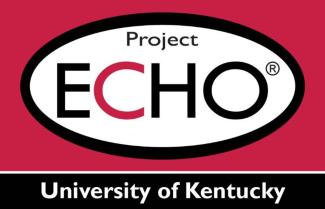Listen to a short summary of this research brief (1:40)
Volume 12, Issue 2, April, 2024 Evidence in Action A quarterly research brief from the Center on Trauma and Children
Staying Well at Work: Individual and Organizational Outcomes
Sprang, G., Gusler, S., LaJoie, S., Eslinger, J., & Smith, E. (2023). Using Project ECHO to Keep Professionals Well at Work: Individual and Organizational Outcomes, Academic Psychiatry. https://doi.org/10.1007/s40596-023-01754-0
Based on the well-documented negative impact of COVID-19 on the mental wellbeing of the workforce (Holmes et al., 2020), research is needed to establish interventions that can be applied to a wild-scale, diverse audience. This study examined the effectiveness of using an intervention called the Project Extension for Community Healthcare Outcomes (Project ECHO) to address the mental health toll of COVID-19 on the workforce. Three different ECHO sessions were conducted over 18 months, focusing on stress management and emotion regulation using a window of tolerance model on both the individual and organizational levels. The sessions utilized case presentations, didactics, breakout discussions, and mindfulness activities. Participants, mostly from healthcare organizations and schools, engaged in discussions and activities aimed at enhancing individual resilience and improving organizational policies. Participants reported improvements in resilience-building and policy-making, as well as integration of stress management skills into their practices.

The study found that attendees rated the sessions highly impactful and useful, with a significant correlation between attendance and positive outcomes. The Net Promoter Score was high, indicating willingness to recommend the sessions. On the organizational level, significant improvements were seen in organizational resilience and policy development. The study highlights the effectiveness of the ECHO framework in addressing workforce well-being during the pandemic and emphasizes the importance of a bifocal approach targeting both individual and organizational strategies. Limitations include the lack of a comparison group and self-reporting bias.
Overall, the study underscores the importance of adapting and implementing innovative strategies, like Project ECHO, to address the mental health challenges faced by the workforce during the COVID-19 pandemic. It demonstrates the potential of ECHO in fostering champion behaviors and influencing policy-making to support workforce well-being. The study shows how Project ECHO can be utilized to improve well-being across various disciplines during times of crisis. Lastly, the study emphasizes the need for ongoing research to evaluate the long-term impact of such interventions and further refine their effectiveness in supporting workforce resilience and well-being.
Translational Tips
- Those developing interventions should consider utilizing a two-pronged approach, addressing issues at both the individual and organizational level
- Prioritize promoting workplace champion behavior to increase the impact of interventions
- Interventions do not necessarily need to directly target organizational policy changes. Strategies such as Project ECHO may lead to long-lasting policy changes that focus on wellness, even if that is not the specific focus of the intervention.
References
Holmes, E. A., O’Connor, R. C., Perry, V. H., Tracey, I., Wessely, S., Arseneault, L., Ballard, C., Christensen, H., Cohen Silver, R., Everall, I., Ford, T., John, A., Kabir, T., King, K., Madan, I., Michie, S., Przybylski, A. K., Shafran, R., Sweeney, A., … Bullmore, E. (2020). Multidisciplinary research priorities for the COVID-19 pandemic: a call for action for mental health science. The Lancet. Psychiatry, 7(6), 547–560. https://doi.org/10.1016/S2215-0366(20)30168-1

Adobe Stock